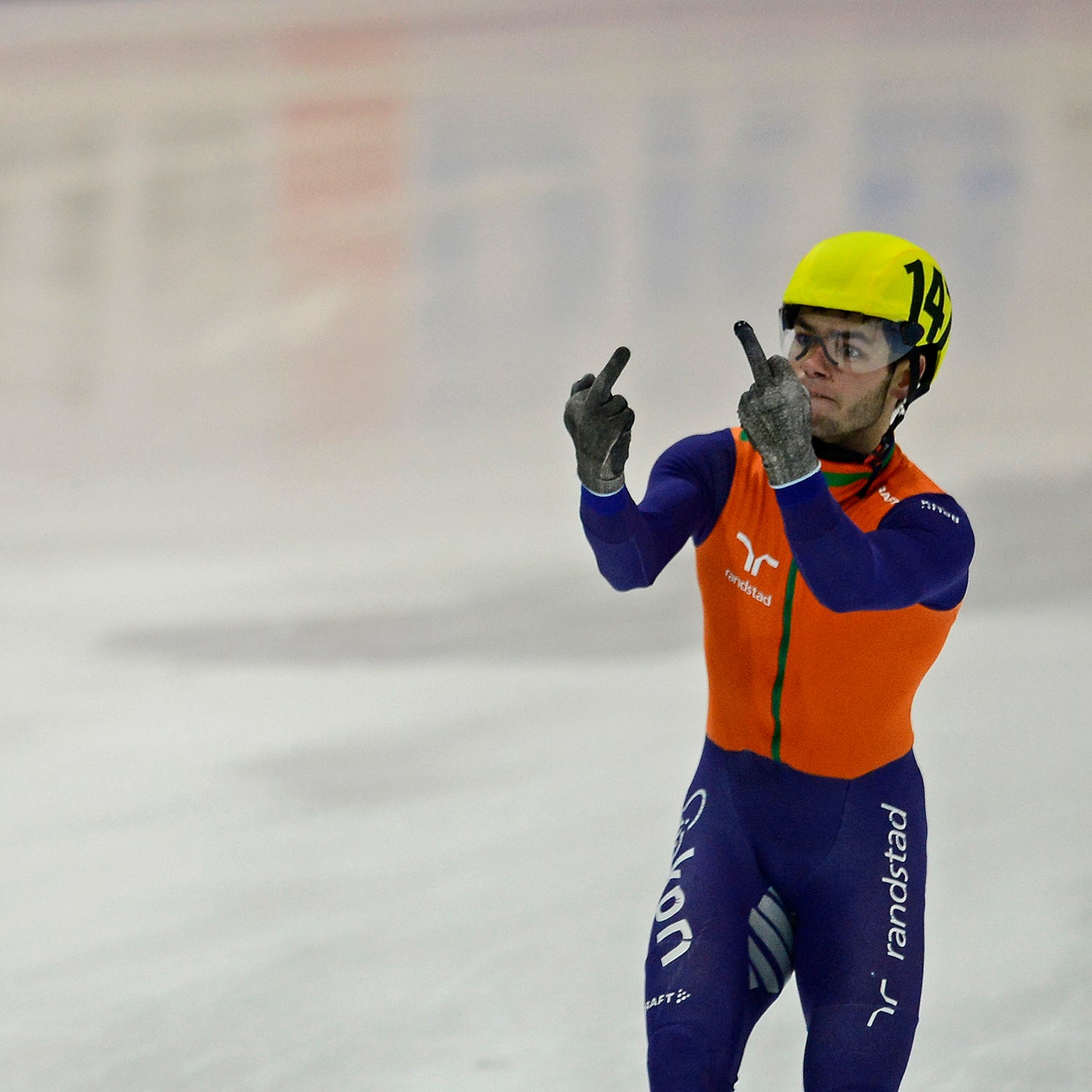When eventual Boston Marathon winner Desiree Linden pulled over to wait for her friend and competitor Shalane Flanagan during a nature call last month, it reminded me of a similar run-in I had with a chemical toilet five years ago. How could it be, I wondered, that two unrelated Porta-Potty incidents raised such monumental questions about sportsmanship?
By now you know about . The second, in Rocky Mountain National Park, is lesser known. No titles were on the line. It was an informal group ride up Trail Ridge Road, a famed Colorado climb that’s ridden for the views, camaraderie, and novelty of the park. Six of us clipped in and chatted amicably as a light rain fell. Nothing foreshadowed the animosity that followed.
Moments later, when our friend Herr Doktor announced that he’d drunk too much coffee, four of us pulled over at a row of portable toilets to wait at a safe distance. That’s when our sixth friend, the Rabbit—a nickname he earned by animating group rides for years, baiting the greyhounds to chase—eyeballed us over his shoulder and attacked. My first reaction was to smile. It’s a faux charge, I thought. He’s just getting a laugh. But the Rabbit kept going, disappearing into the mist long before Herr Doktor finished his constitutionals. We didn’t see him again until arriving at the visitor center near the top of the pass—nearly three hours later.
Let Linden’s and the Rabbit’s Porta-Potty incidents serve as guideposts for what does not constitute sportsmanship. On the one hand, you have an elite athlete (Linden) willing to risk the Boston Marathon out of an altruistic if misguided allegiance to a friend she somehow thought she could help through the plastic doors of a mobile outhouse. On the other hand, the Rabbit, capitalizing on a friendly rival’s bowel movement. Both examples fall outside the norms of good sportsmanship. Let’s explore some more.
Not to dwell on defecation, but last year at the Giro d’Italia, Tom Dumoulin was wearing the race leader’s pink jersey when his innards notified him that they must expel—immediately. about what happened next—the scant bush, the waddle—but when Tom pulled over, his competitors gradually attacked, gapping the maglia rosa and knocking him from pink by stage end.
Were they cads for doing so? While the Grand Tours have a tradition of waiting for the race leader during such crises, in this case, the peloton wasn’t soft-pedaling. The race was on. Dumoulin had a choice. Race on and humiliate himself, or risk the bushes—and the jersey. Despite the grief about poor sportsmanship they took at the time, the general category racers who buried themselves were unassailable. Triathletes crap and barf all over themselves all the time and nobody waits. Racers need to watch what they eat. And Dumoulin, it should be noted, fought back to win the overall. Like a fecal phoenix, he was all the more likable after he arose from his nadir.
Next up, a hypothetical: Say you’re on a long group ride or run with friends. The route has been agreed upon by all parties. The pace will be challenging, but there will be two spots to regroup if stragglers get popped. Everybody knows the deal. It’s a training-race atmosphere. Except one person in the party isn’t playing by the same rules. At the turn for the canyon, she guns it, clearly at threshold pace. Startled, the group gives chase and shatters. One by one, everyone collapses into the first regroup, blown for the rest of the outing. That’s when our attacker announces she’s turning around. “Kid duty, work is piling up, out-of-town guests.” Three times this has happened to me; once, regretfully, the charge was led by Herr Doktor, who at least was playing a practical joke. The other perpetrators had issues. (Divorces do strange things to parents on bikes.) Either way, they were outside the lines of rivalry etiquette.
Whether I’ve soiled my chamois or blown a tire, I’ll accept your post-race empathy. I don’t want your in-race sympathy.
Being too nice can also muck things up. The time my buddy waited for me at the Breck Epic after my crank flew off my mountain bike and down a ravine? Chivalrous but unnecessary and, as with Linden in Boston, too much of a bleeding-heart response. Whether I’ve soiled my chamois or blown a tire, I’ll accept your post-race empathy. I don’t want your in-race sympathy. Mechanical failures are part of mountain biking. (As an aside, they should be fair game for attacks in the Tour de France, too.) Recent Commonwealth Games mountain bike champion Sam Gaze learned this lesson last month after he flipped the bird at teammate Anton Cooper for when Gaze suffered a flat. Like a less cheer-worthy Linden or Dumoulin, Gaze eventually caught back on and won. He later apologized to the fans and his teammate, but Gaze should know that self-reliant mountain bike racing doesn’t suffer fools who would stop for somebody else’s breakdown–or a teammate’s, for that matter. Mountain biking and marathon running generally aren’t team sports.
Whether too compassionate or too Machiavellian, sportsmanship-challenged people don’t need our ridicule; they need our help. Middle school gym teachers with fanny packs should have long ago ingrained in the softies that, outside of an actual emergency, stopping and waiting in a race is quitting. Sentimentalism takes competition out of sport. Contrariwise, racing in a nonrace setting only works if everyone agrees on the rules. Perhaps it’s a Boulder thing, but last fall, while organizing a guys’ mountain bike trip to Crested Butte, I found myself needing to act as a governing body. “We’ll wear baggy shorts, no race kits, and we’ll wait at trail intersections. When climbs present themselves, those who want to gun it can, but they’ll need to wait up top.”
Maybe it’s all pointless. You can’t change people. Once, the Rabbit (it’s always the Rabbit) and our mutual bleeding-heart friend entered an epic Central American mountain bike race as a team. The Rabbit promptly attacked Bleeding Heart—his own teammate—to the point of exhaustion. They ended up taking turns pushing each other to the summit. The world balances itself out.
To be fair, off the bike, the Rabbit is one of the most positive and big-hearted human beings I’ve ever met. A “stalwart and patient friend in street clothes,” according to Bleeding Heart. In his day job, he works with troubled teens. The Rabbit attributes his on-bike ego to a youth spent in the highly competitive dance world. The result is that when he’s clipped into pedals, the Rabbit’s brain—like Gaze and Linden—doesn’t cipher all that sportsmanship entails. He once thought it was possible to “win” a mountain biking weekend in Fruita. He was only half-joking.
Some people see a friend in a Porta-Potty as someone in need of help. Others see a chance to send it. But either way, if you gotta go, you gotta go.


